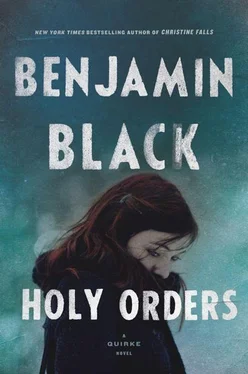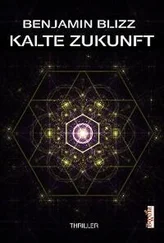Strange, but he was not all that surprised to hear about Minor. It was a shock, certainly, but there was a sense of inevitability, too. Why was that? There had always been something of the victim about Jimmy Minor. He had been too intense, had taken everything too seriously. He had never acknowledged the entertainment aspect of what they did, the showbiz side of newspapers. He had seen himself as a crusader, a Clark Kent who one day soon would turn into Superman. Harry stood at the window now, leaning on his putter and gazing down on the rain-washed quayside and the stippled gray river. What had Minor been up to, that a person or persons unknown had thought it necessary to beat the living daylights out of him? Was his death connected with his work, or was it something personal that had done for him? He had been the secretive type, a loner. The misfortunate poor little bastard.
He picked up the phone and dialed zero. Miss Somers still had a tremor in her voice. He asked if Smyth, the news editor, was in yet, and she said yes, and he told her to send him in. Smyth knew everything there was to know about his staff men.
Archie Smyth had been running the news desk for longer than anyone could remember. He seemed ageless, with a baby’s blue eyes and oiled black hair combed back tight against his skull. His trademark was a sleeveless blue pullover that he wore every day — the office joke was that eventually he would have to go into hospital and have it surgically removed. He was a decent fellow, hard-working and diligent; a Protestant, of course, hence the y in his surname. Harry trusted him, and depended on him to be his eyes and ears about the office. If there was anyone who could shed light on Jimmy Minor’s death, it would be Archie.
“You heard?” Harry said.
Archie nodded. “I heard.”
Over the years Archie’s blue pullover had been steadily shrinking, and by now it was so short that it did not quite cover the waistband of his trousers, where the latches of his braces were to be seen, like two pairs of splayed fingers giving upside-down V signs. Recently he had lost his wife, but he had been back on the job the day after the funeral. There was a son who worked on one of the Fleet Street papers, the Telegraph, was it, or the Times ? Archie was fiercely proud of him.
“Any ideas?”
Archie shook his head. “Can’t say I have.”
“Was he on a story?”
“If he was, he didn’t tell me. But that wouldn’t be unusual — you know what he was like.”
In fact, Harry did not know what Jimmy Minor had been like. Harry avoided direct dealings with the staff. Most of them despised him, he knew, especially the older lot, who still had not forgiven him for replacing Bill Burroughs, his predecessor, to whom Francie Jewell had unceremoniously given the shove. “But you hadn’t put him on anything?” he persisted now.
Archie made a show of trying to recollect. “No, there was nothing special — so far as I know, as I say. He’d been on Dáil duty but asked to come off it.”
“Why?”
“He didn’t say.” Harry had a keen look fixed on him. “Listen, boss, Jimmy was a good lad. He had a good nose. There aren’t many on the desk I’d have given the kind of leeway to that I gave him.”
Harry held the putter at arm’s length and sighted along it with one eye shut. “What about his — his private life?”
“What about it?”
Archie had taken on a stony expression; knowing what was going on in the office was one thing, but it was no business of his to stick his nose into whatever it was his staff might get up to in their own time.
“He wasn’t married?” Harry said, still peering along the shaft of the club.
“No.”
“Girlfriend?”
Archie gave a slight cough. “I never asked.”
“Right.” Harry set the putter leaning against the windowsill and threw himself down in his chair behind his desk. Rain whispered against the windowpanes. “Come on, Archie,” he said impatiently. “You know what I’m asking you.”
Archie was still stony. “He used to go around with April Latimer,” he said.
“The one that disappeared?” Harry gnawed at a knuckle, thinking. “When you say, ‘go around with,’ what does that mean?”
“They were friends.”
“But she wasn’t his girlfriend.”
Archie shrugged. Harry turned in his chair and looked out again at the river and the great swag of lead-blue cloud louring above it. “Has the chief been told?” he asked.
The chief was Carlton Sumner, proprietor of the Clarion, having taken it over from Diamond Dick Jewell’s widow. The mere mention of his name brought a slight chill into the air. Everyone in the building was more or less afraid of Carlton Sumner, which was exactly how Carlton Sumner wished everyone to be.
“ I haven’t told him,” Archie said, by which he meant it was Harry’s job to break that kind of news to Sumner.
Harry bit at his knuckle again. “I better call him, I suppose,” he said gloomily.
At that moment, as if on cue, the telephone on his desk rang. He snatched up the receiver. He listened for a moment, then sighed. “Send him in,” he said, and replaced the receiver in its cradle. He looked at Archie. “It’s Hackett.”
Harry did not like policemen; they made him nervous, as if he had a guilty secret he had forgotten about that they were going to remind him of. Hackett was one of the sly ones, pretending to be a simple fellow up from the country while in reality he was as sharp as a tack. He came in now with his hat in his hand, wearing his bland, froggy smile. He nodded to Archie, who nodded back. All three had known each other for a long time.
“This is a bad business,” Hackett said, and put his hat down on the corner of Harry’s desk.
Harry, who had not risen from his chair, looked at the hat, then glanced up at the detective narrowly. “Yes,” he said. “A tragedy. Terrible for the paper, too — for all of us.”
Hackett was still smiling, his tongue stuck at the corner of his wide, thin mouth. “Oh, aye,” he said, with only the faintest hint of irony, “a tragedy indeed. His family is fairly upset too.”
Archie Smyth watched the two men with a keen eye. Archie was a peaceable soul, and it fascinated him how suddenly animosity could spring up between two men, especially men such as these. Harry, the working-class boy made good, was always on the lookout for slights. It was obvious he found Hackett’s smile irritating, and resented his air of prizing and deeply enjoying a private joke. Now Hackett took a chair that had been standing by the wall and brought it to the desk and sat down. Archie noted his lumpy, bright blue woolen socks; his missus must have knitted them for him.
“Do you know who did it?” Harry Clancy asked.
“I do not,” Hackett said, almost complacently.
Harry scowled. “You must have some idea.”
The detective shook his head, still easy, still smiling. There was a silence. From deep down in the bowels of the building a low drumming sound began to build that made the floor vibrate under their feet. The presses had started up, and would soon be printing the early edition of the Evening Echo , the Clarion ’s sister paper, which came out in the late afternoon.
“I’d like,” Hackett said, “to have a look at Jimmy Minor’s desk.”
Harry Clancy glanced at Archie. “Has he got a desk?”
“Shares one,” Archie said. “With Stenson — Stenson is on the Echo . He has it during the day, Jimmy at night.”
Hackett turned to him. “Can I see it?”
Archie hesitated, but Harry Clancy waved a hand dismissively and said to Hackett that of course he could see the bloody desk, that they had no secrets here. He was getting into one of his tempers, Archie saw, and was glad of the excuse to make an exit. “This way,” he said to Hackett.
Читать дальше












